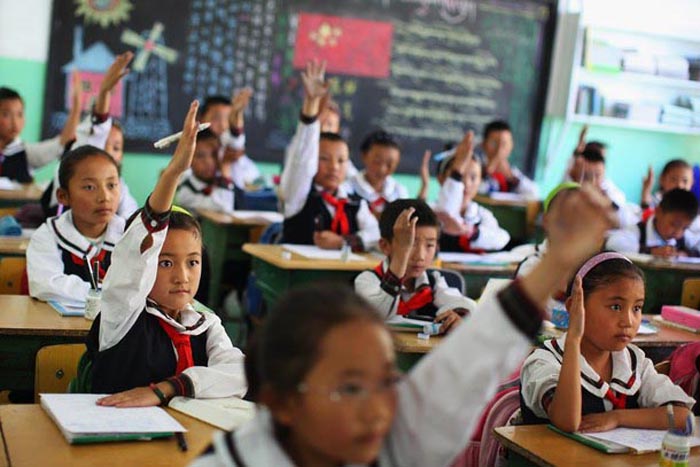
(TibetanReview.net, Apr16’20) – In the name of bilingual education, China is increasingly replacing Tibetan with Mandarin Chinese as the language of instruction in schools in Tibet while Tibetans advocating the preservation of their linguistic culture are being punished for committing “political crime”, said New York-based Human Rights Watch in a report Apr 15.
While since the 1960s Chinese medium was used in nearly all middle and high schools in Tibet Autonomous Region (TAR), where nearly half of the Tibetan population live, practices introduced over the last decade are leading more primary schools and even kindergartens to use Chinese as the teaching language for Tibetan students. This appears to have become the norm for primary schools in Tibetan urban areas and the practice is spreading to the countryside, the report said.
China formally introduced a policy of “bilingual education” in 2010 for schools in all minority areas in China. And the official position of the regional authorities in Tibet was that both the Tibetan and Chinese languages should be “promoted,” leaving individual schools to decide which language to make a priority as the teaching medium.
However, those schools are now increasingly staffed by non-Tibetan-speaking teachers, have virtually no Tibetan textbooks, and have isolated the use of Tibetan to Tibetan-language classes, the group said.
The group quotes a former part-time teacher from Tibet’s capital Lhasa a saying: “In primary school, the Tibetan teachers … have a strong urgency to teach Tibetan, but the biggest problem is that they lack methods and materials.”
Besides, China’s promotion of “mixed classes” that include both Tibetan and Chinese pupils and its emphasis on bringing educational benefits in terms of diversity, facilities and standards, means that Tibetan cannot be taught as the language of instruction.
Chinese authorities are said to insist that Tibet’s “stability” rests on the success of “ethnic mingling” and “identification” policies that place a far higher premium on political loyalty to the Chinese Communist Party than they do education or cultural rights.
While many Tibetan parents favour their children learning both languages, there is considerable opposition to the Chinese authorities’ current approach, which erodes the Tibetan language skills of children and forces them to consume political ideology and ideas largely contrary to those of their parents and community, the report said.
The Tibetan language is not only sidelined in the education system but actively discouraged and even cracked down on among the general populace.
In Feb 2019, Tsering Dorje, who lived in a village near Mt. Everest, was detained for a month in a “reeducation facility,” a form of detention, during which he was interrogated and beaten. His alleged crime was that he had discussed with his brother who lived outside the country the importance of Tibetan language instruction for their children. The local police who had intercepted the call told his family that such a conversation was a “political crime,” the report said.
The report also notes that twice in 2015, Tibetan language-rights campaigner Tashi Wangchuk tried to file formal complaints in Beijing concerning the absence of Tibetan-language teaching in his area only to be arrested in early 2016 after the New York Times interviewed him about his advocacy efforts. He was later jailed for five years, with the Chinese court saying he was guilty of “inciting separatism.”
The report also notes that in early 2018, the regional Chinese police issued a public notice that declared organizations campaigning on “mother tongue” issues illegal and a form of “underworld gang crime.”





